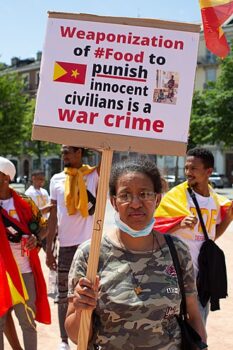
As part of Praxis Week 2022, we ran a seminar at UCC on the War in the Tigray region of Ethiopia. This was on (Monday 4th April)
Speakers included Dr. Nick Chisholm, International Development & Food Policy, UCC, Mr. Temesgen Yalew, PhD Student UCC and Mr. Zelalem Hadush, PhD Student UCC
This is a short reflection from one of the speakers, Zelalem Sibhat.
At the beginning of 2018, the four sister parties making up the Ethiopian People’s Revolutionary Democratic Front (EPRDF), the coalition governing Ethiopia at the time, investigated the drawbacks of the regime and concluded that they all bore responsibility for reforms where needed. Following this, Abiy Ahmed was selected as chairperson of the coalition and consequently prime minister of the state in March 2018.
Almost immediately, however, he started using what is known as ‘4D’ tactics (Defining, Defamation, Distinction, and Detaining) on Tigrayans, setting the course for genocide as follows:
· The government used documentaries and dehumanizing terms to define Tigrayans in various public speeches such as ‘Daytime hyena’, ‘Tigrigna speakers’, ‘Cancers’, ‘weeds’, ‘Greedy Junta’, ‘Looters’.
· The government and its allies worked to alienate Tigrayans form other ethnic groups. Other Ethiopians were conditioned to accept any punishment actions against the
Tigrayans as legal and normal. In other words, Tigrayans were criminalised simply for being Tigrayan.
· While Tigrayans were illegally and unjustly detained since PM Abiy came to power this increased immeasurably after the onset of the war on Tigray in November 4, 2020. In October 2021, the state declared a state of emergency, which persecuted Tigrayans. Tens of thousands were detained and executed all over the country. https://www.hrw.org/news/2022/04/06/crimes-against-humanity-and-ethnic-cleansing-ethiopias-western-tigray-zone
As educators, we need to engage and be a part of the answer to war and crimes such as those taking place in place in regions such as Tigray. Education, as a primary means of information in all societies, needs to take on board the fact that it can be an active force for peace and justice globally.
